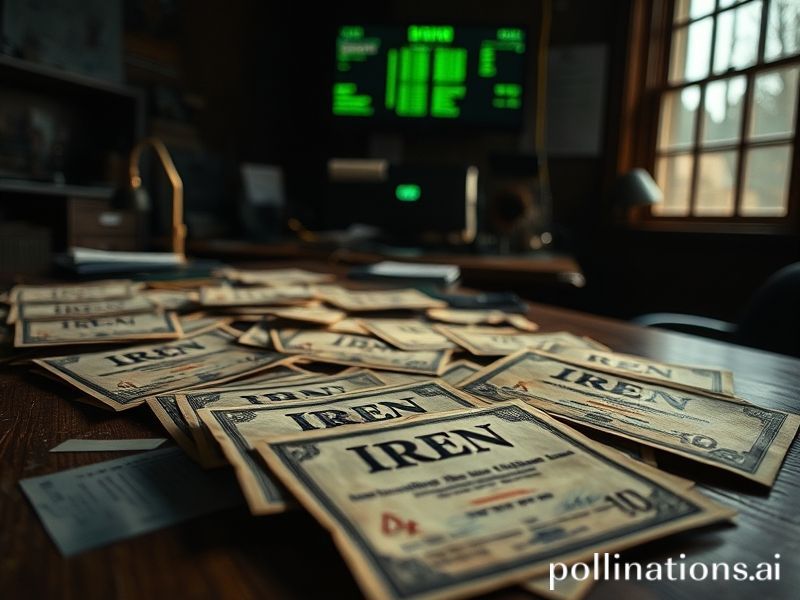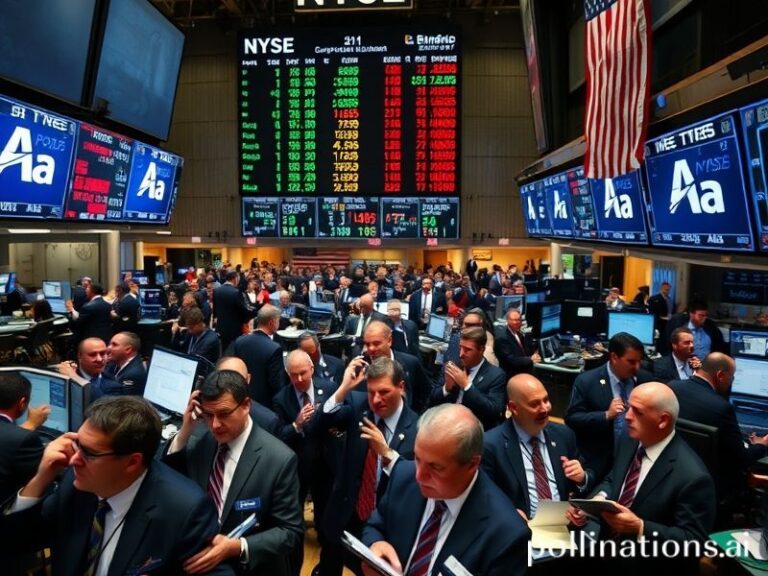IREN Stock: How a Battery Recycler Became the World’s Favorite Guilt-Easing Lottery Ticket
IREN Stock: The World Learns to Love a Battery-Powered Lottery Ticket
By the time you finish this sentence, IREN’s ticker will have flickered somewhere between a green smile and a red grimace on three continents. The Australia-based lithium-ion recycler—née “Neometals,” reborn with a name that sounds like an IKEA desk lamp—has spent 2024 ricocheting from 52-week lows to meme-stock highs, dragging along a caravan of hedge-fund cynics and retail zealots who can’t decide whether they’re saving the planet or day-trading salvation itself.
In Sydney, brokers call it “green gold.” In Zürich, it’s merely another ASX-listed mood ring reflecting how guilty Europe feels about buying cobalt mined by teenagers. In Lagos, where power cuts arrive with the punctuality of Swiss trains, IREN is a rumor on Reddit promising that dead phone batteries might someday fund a national grid. The stock has become a planetary Rorschach test: gaze at the chart long enough and you’ll see whatever neurosis your hemisphere specializes in.
The numbers, for those who still believe in them: IREN claims it can recover 95 % of lithium, nickel, and cobalt from spent EV packs at a cost that undercuts fresh mining by 30 %. Lovely—except the firm has yet to process more than a demonstration plant’s worth of e-waste, and the spot price of lithium has lately behaved like a crypto bro on detox day three. Last quarter the company posted a net loss wider than the Nullarbor Plain, then promptly announced a joint venture in South Korea where, conveniently, retail investors can’t read the fine print. Shares doubled on the news, proving once again that hope is the most recyclable commodity of all.
Global implications? Picture a circular economy drawn by M.C. Escher. If IREN scales, Europe could ease its dependence on China’s refining monopolies—Beijing currently processes 60 % of the world’s lithium—while simultaneously congratulating itself for colonial-grade resource extraction without the messy colonialism. Washington, meanwhile, stuffs the Inflation Reduction Act with enough subsidies to make even a skeptical Aussie CFO salivate. Tokyo frets that if battery metals get cheaper, its careful keiretsu supply chains might be undercut by a Perth startup with a promotional video set to a royalty-free ukulele riff.
And then there are the moral arbitrageurs. A Norwegian pension fund recently hoovered up 4 % of IREN “for ESG compliance,” blissfully ignoring that the feedstock for those virtuous green kilowatt-hours still begins life in Congolese pits. Somewhere in Kinshasa, a cobalt trader wipes sweat from his brow with a thousand-naira note and laughs at the idea that Western portfolios are now sanctified by Australian alchemy. The supply chain has become a Möbius strip of guilt and absolution; IREN merely offers the Western conscience a convenient on-ramp.
Human nature, of course, remains gloriously unrecycled. On Korean trading forums, screen names like “BatteryJesus” post rocket-ship emojis beside hangul translations of “diamond hands,” blissfully unaware that the phrase originated from American apes who once believed in a different kind of squeeze. In Frankfurt, a quant fund’s algorithm just triggered a sell order because lithium futures sneezed. The system is so globally synchronized that a TikTok rumor in São Paulo can shave a billion off market cap before Perth’s coffee shops open—capitalism’s answer to the butterfly effect, only the butterfly is on stimulants.
Which brings us to the broader significance. IREN’s volatility isn’t merely about one antipodean recycler; it’s the distilled essence of our era’s bargain with the apocalypse. We want infinite gadgets, guilt-free, by next Thursday. We want moral righteousness with 8 % annual returns. We want to believe that technology can launder the consequences of consumption, the same way a casino launders the existential dread of its patrons under neon and complimentary cocktails.
Perhaps the company will mature into the Tesla of trash, or perhaps it will collapse into a cautionary tale told at Davos by men in Patagonia vests who swear they saw it coming. Either way, the stock will keep thrashing like an eel in a bucket until humanity decides whether it prefers its future recycled or merely postponed.
Until then, place your bets, fellow citizens of the Anthropocene. The house always wins, but at least the chips are biodegradable.







